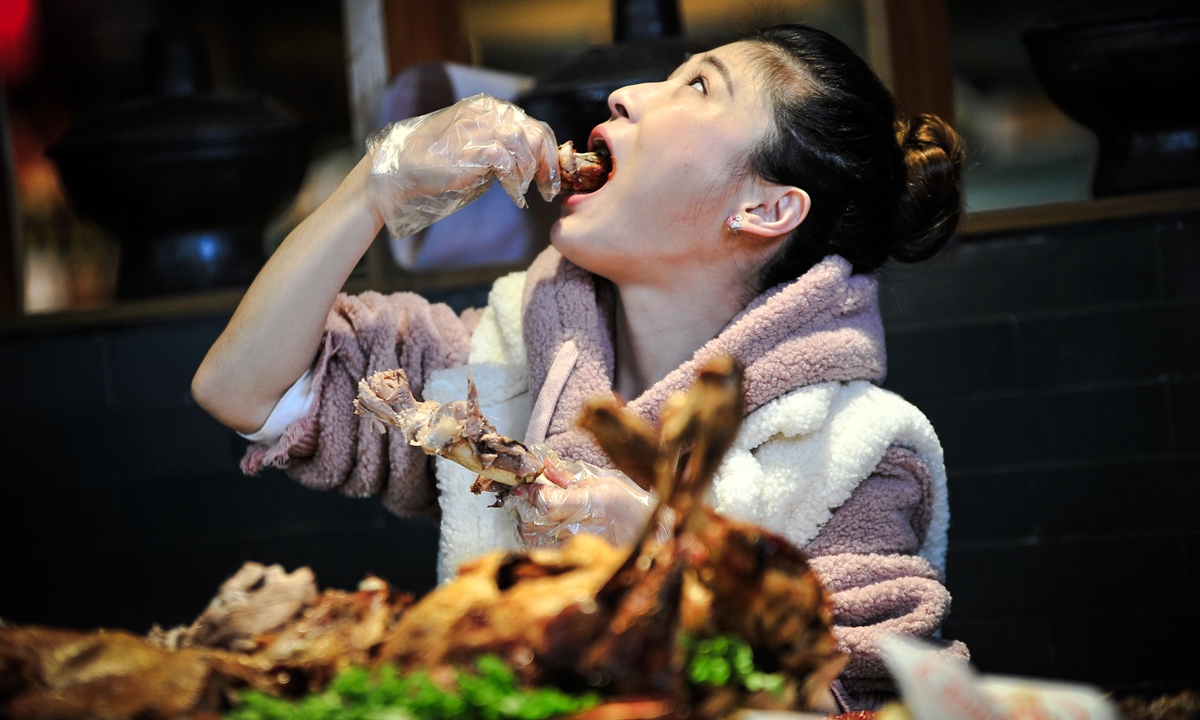
binge-eating Photo: VCG
China officially adopted a law against food waste on Thursday, banning binge-eating videos and excessive leftovers, which observers said will foster a resource-conserving and environmentally-friendly society.
The long-awaited law was officially approved by the Standing Committee of the National People's Congress (NPC) on Thursday. It is expected to establish a basic code of conduct and build a long-term mechanism to stop food waste and guide society to foster rational and healthy catering consumption habits.
Chinese leaders have frequently emphasized the necessity of preventing food waste, despite the fact that China has seen consecutive bumper harvests.
Observers noted that adoption of the legislation against food waste does not imply that China is facing an immediate food shortage risk, but it is a far-sighted move for food security as the country seeks to stabilize domestic grain output and ensure supply, facing increasing domestic demand for grain due to population growth and external uncertainties.
The 32-clause law bans food vloggers from making and distributing binge-eating videos online, threatening fines of up to 100,000 yuan ($15,451). Some vloggers perform on short-video platforms pretending to be competitive eaters but in reality, they usually leave a lot of food uneaten and often vomit what they have consumed.
The law also allows restaurants to charge diners an extra fee if they leave excessive amounts of food uneaten. Food providers that induce or mislead consumers into making excessive orders face fines of up to 10,000 yuan. A maximum fine of 50,000 yuan will be given to food service operators that waste large amounts of food, the law stipulates.
The legislation was widely hailed on Chinese social media on Thursday after its approval, with many internet users showing their empty plates on desks on Sina Weibo. However, some have expressed concerns as specific rules have yet to come out to define what constitutes food waste and how the law will be enforced.
Legal experts reached by the Global Times said the main role of this law is to spearhead the advocacy of a resource-conserving and environmentally-friendly society.
Zheng Fengtian, a professor at Renmin University of China's School of Agricultural Economics and Rural Development, told the Global Times that the legislation will guide enterprises, consumers and governments in the food industry chain in how to tackle severe waste problems in a legal manner, using either penalties or awards to regulate food waste.
Approximately 18 billion kilograms of food is wasted every year in China's urban catering industry, the Xinhua News Agency reported, citing nationwide field research carried out by NPC Congress deputies.
The expert refuted claims that China is suffering a food crisis, saying that is the interpretation and speculation of Western media seeking to promote the "Chinese collapse theory."
Some observers said that the root of food security is agricultural security. The legislation complies with the central government's policy of placing emphasis on cultivation of grain and poultry as part of efforts to ensure stable food supply.
The law encourages the continuation of the "Clear Your Plate" campaign.
Prior to the adoption of the law, a nationwide "Clear Your Plate" campaign gained steam across the country, with anti-food waste posters and slogans posted on the walls of many restaurants, while schools and universities have also joined the efforts to fight food waste.




